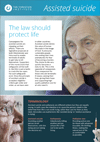Introducing assisted suicide would thwart efforts to help vulnerable people, Peers have warned.
Lord Alton said society helps suicidal people to live, not die, but legalising assisted suicide would “cut completely across” such attempts.
His comments chime with concerns from Baroness Hollins – a former President of the Royal College of Psychiatrists – who said assisted suicide would seriously damage the trust between doctors and patients.
Change the law
The Peers made their comments as Rob Marris MP attempts to bring in assisted suicide through a Private Member’s Bill. A vote will take place on 11 September.
Lord Alton, writing on The Spectator’s website, pointed to concerning developments in other countries that have brought in euthanasia.
In Belgium, which introduced euthanasia in 2002, a 24-year-old woman has recently been told that she can be medically killed because she suffers from ‘suicidal thoughts’.
‘Sugar-coated’
Lord Alton said: “And now Parliament is being asked to legalise a variant of this here – what is being referred to by the sugar-coated name ‘assisted dying’ but is in reality assisted suicide.
“What is being proposed is that terminally ill people should be supplied, on request, with lethal drugs if they are thought to meet certain criteria.
“Such a law would cut completely across social attitudes to suicide.
Help to live
“We are rightly compassionate and understanding about suicide. But as a society we are clear that suicide itself is not something to be encouraged, much less assisted.
“We have suicide prevention strategies and suicide watches. When we come across people who are suicidal, we try to help them to live rather than to kill themselves.”
Baroness Hollins’ comments came in a blog for Roman Catholic newspaper The Tablet, where she said that assisted suicide laws “have within themselves the seeds of their own extension”.
Serious threat
“As in Belgium, proposals to change the law in the UK would put mentally ill people at risk”, she continued.
“In my opinion as a psychiatrist, such a law would seriously threaten the trust that patients with any serious illness, perhaps especially a mental illness, needs to have in their doctor”, Lady Hollins concluded.



